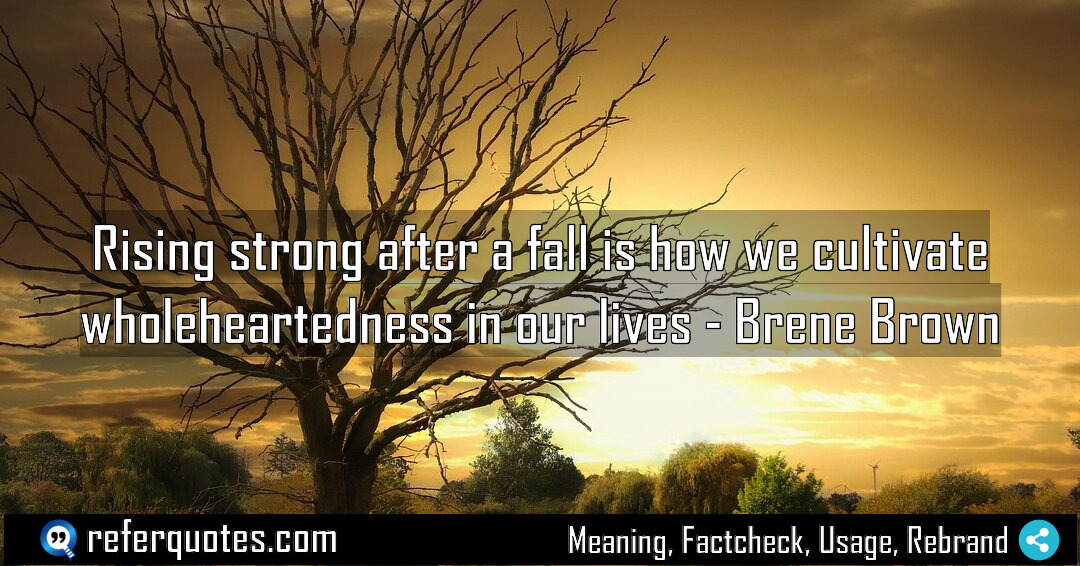
Rising strong after a fall… it’s not just about bouncing back. It’s the messy, necessary work of building a life of genuine courage and connection, piece by piece.
Share Image Quote:
Table of Contents
Meaning
At its core, this quote means that our deepest sense of self-worth and authenticity isn’t found in avoiding failure, but in how we choose to get back up and integrate the lessons from our falls.
Explanation
Let me break this down a bit. You see, most of us think wholeheartedness is something you either have or you don’t. A personality trait. But Brene’s work flips that entirely.
She’s saying that the *process* of rising strong—that messy, often painful, sometimes embarrassing work of reckoning with a failure or a fall—is the actual *practice ground*. It’s the gym where you build the muscle of wholeheartedness. You don’t get it by staying safe. You earn it in the trenches, when you’re willing to get curious about your story, to rumble with the tough emotions, and to write a new, more honest ending. It’s active, not passive.
Quote Summary
Reading Level36
Aesthetic Score84
Origin & Factcheck
This is straight from Brené Brown’s 2015 book, Rising Strong. It’s a cornerstone of her research on vulnerability and shame. You sometimes see it floating around online without attribution, but it’s 100% hers, born from her extensive qualitative data and work in the United States.
Attribution Summary
Author Bio
Dr Brene Brown is the author of books such as Daring Greatly and The Power of Vulnerability. The TED talk and Netflix production based on her research reached out to millions of audience. She researches effects of courage and vulnerability in shaping people's work and relationships. She leads the Brené Brown Education and Research Group and provides evidence-based insights into practical tools to help people train themselves
Official Website |Facebook | X | Instagram | YouTube |
Where is this quotation located?
| Quotation | Rising strong after a fall is how we cultivate wholeheartedness in our lives |
| Book Details | Publication Year/Date: 2015; ISBN/Unique Identifier: 9780812995824; Last edition. Number of pages: 336. |
| Where is it? | Approximate page, The Revolution section |
Context
In the book, this isn’t just a nice sentiment. It’s the conclusion of her three-part “Rising Strong Process”: The Reckoning (walking into your story), The Rumble (owning your truth), and The Revolution. This quote is the payoff—the “why” we put ourselves through the difficult rumble. It’s the promise that the struggle has a profound purpose: to cultivate a way of living that is deeply integrated and authentic.
Usage Examples
This is where it gets practical. I use this concept all the time.
- For a team leader: When a project fails, instead of just doing a post-mortem on the *what*, guide your team through a conversation about the *why*. “What story are we telling ourselves about this failure? Let’s rise strong from this, together.” It builds psychological safety and a more resilient culture.
- For a friend going through a breakup: Instead of just saying “you’ll find someone better,” you can share this. It shifts the focus from “getting over it” to “what is this experience teaching me about my own needs and boundaries?” It’s about cultivating self-worth from the inside out.
- For yourself after a personal setback: The next time you feel shame or embarrassment, pause and ask: “What’s the story I’m telling? What part of that is true? How can I write a more courageous ending?” That’s the micro-practice of rising strong.
To whom it appeals?
Share This Quote Image & Motivate
Motivation Score90
Popularity Score92
Shareability Score90
FAQ
Question: What’s the difference between “rising strong” and just “being resilient”?
Answer: Great question. Resilience can sometimes imply just bouncing back to your original shape. Rising strong implies *transformation*. You don’t just bounce back; you integrate the fall, you learn from it, and you actually grow into a stronger, more whole version of yourself. It’s active and transformative.
Question: Does this mean we should seek out failure?
Answer: Not at all. It means we should stop fearing failure so much that it paralyzes us. The goal isn’t to fall, but to recognize that when you *do* fall—and you will—it’s not the end of your story. It’s a critical chapter in building a wholehearted life.
Question: Is “wholeheartedness” the same as happiness?
Answer: No, and this is a key distinction. Happiness is an emotion, it’s fleeting. Wholeheartedness is a way of engaging with the world from a place of worthiness. It means you can experience difficult emotions like grief, fear, and disappointment without them diminishing your sense of self. It’s a much deeper, more stable foundation.
Similar Quotes
You know, “Rising strong requires that we be brave…” is really about the messy, non-negotiable work of turning failure into fuel. It’s not about avoiding the fall; it’s about how…
You know, the process of rising strong begins with the story we tell ourselves. It’s not about the fall itself, but the narrative we build from it. That internal monologue…
We have to be brave enough to own our stories… it’s not just about bouncing back, it’s about forging a stronger self from the ashes of our failures. This is…
You know, “We cultivate love when we allow our most vulnerable…” isn’t just a nice sentiment. It’s a game-changing truth about how real connection is built. It flips the script…
As soon as you honor the present moment, you unlock a profound shift. It’s a simple concept, but it’s the key to dissolving the mental noise that creates most of…
